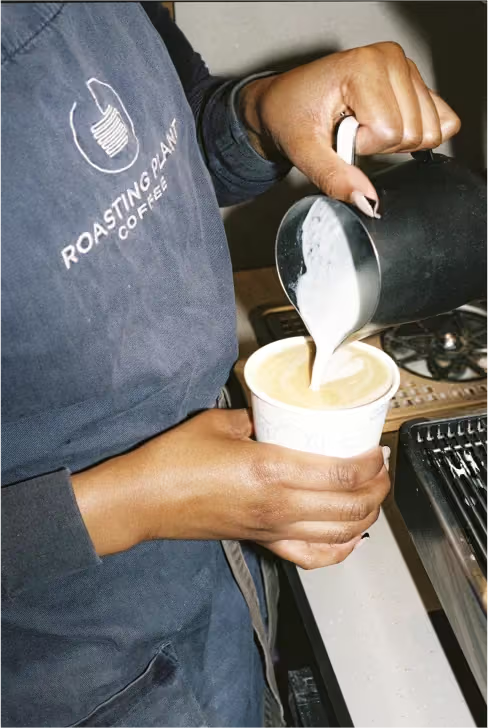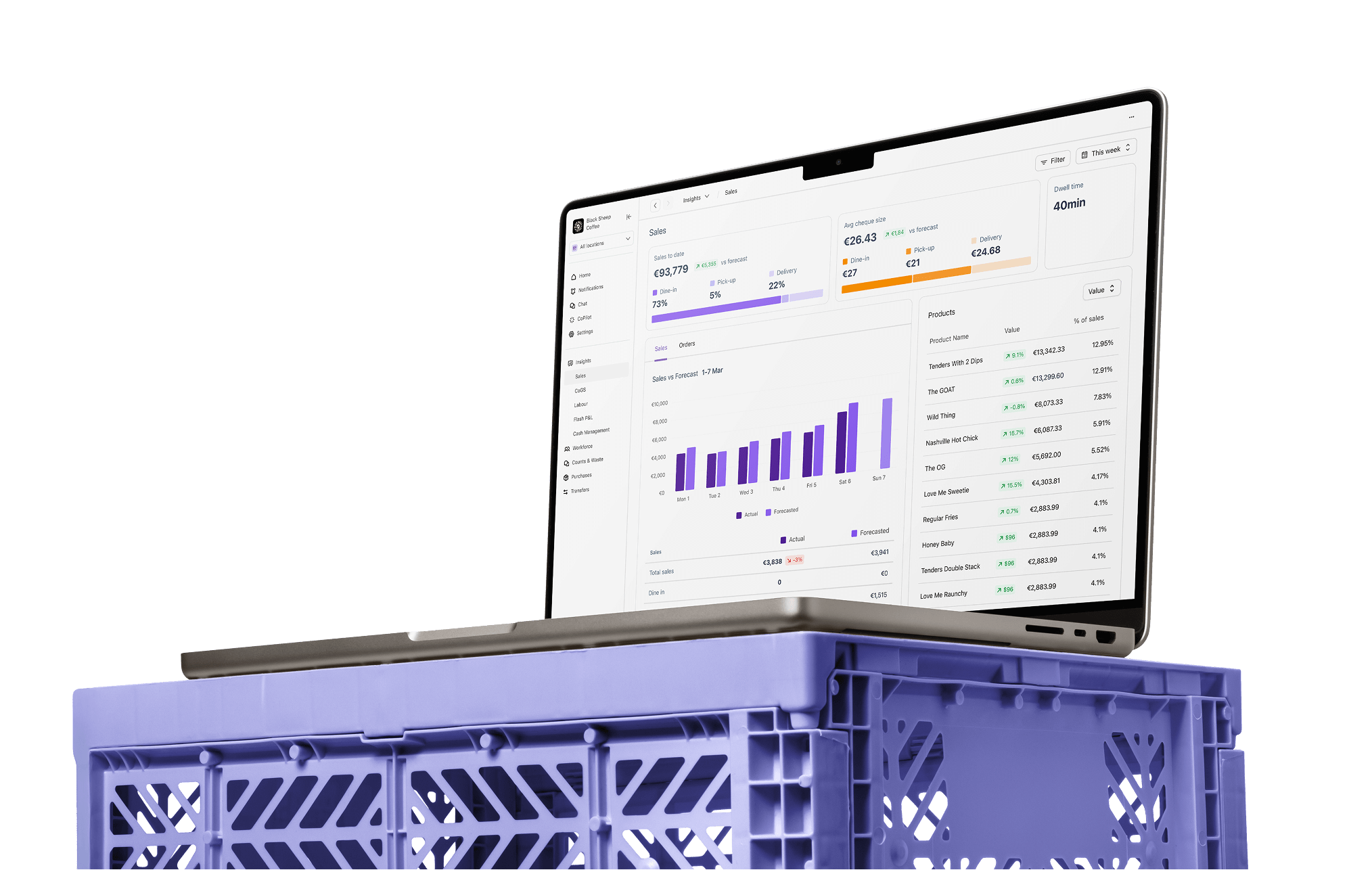How restaurant chains are already successfully using AI
It’s no secret that AI is revolutionising the hospitality industry. Everywhere you look, people are talking about it. 👀
But if you’re new to restaurant tech and aren’t sure how to use AI to your advantage, don’t worry.
In this article, we explore how some of the world’s leading restaurant chains are using AI to give you some inspiration. After all, they’ve got the budget to try and test different systems, right? So why not learn from what they’re doing and save yourself some hassle figuring it out from scratch?
Plus, we cover the benefits of AI in restaurant chains and walk through how to overcome barriers when implementing AI. But first, let’s take a look at how AI has evolved in hospitality over the last few years.
🚨 Learn more about what AI means for us at Nory and how it us used within Nory’s platform
An overview of AI in restaurant chains
In the early days of AI adoption, most restaurant chains were dipping their toes in the water with chatbots. Answering customer queries, making customer bookings, and offering recommendations — these chatbots allowed restaurants to streamline and improve the booking process.
Since then, AI has branched out.
The technology is more advanced, allowing restaurants to forecast sales, optimise staff schedules, order inventory based on demand — the list goes on.
Take a look at Nory as an example. Our AI-powered operating system helps restaurants do all of these things, learning from historical data to make accurate predictions.

The results?
Restaurant operators can make informed decisions about how to boost margins and improve their bottom line.
How AI restaurant chains are using AI for success
A lot of hospitality businesses had reservations about using AI when it first hit the restaurant scene. Surely it would replace the heart and soul of the hospitality industry with a mechanical customer experience?
The way we see it, AI supports your business, it doesn’t replace the people running the show.
Trust us, AI really does help restaurants thrive. We’ve literally seen it happen — take a look at our success stories to see for yourself. 😎
Now, let’s walk through some of the ways AI is helping restaurant chains succeed.
To enhance operational efficiency
If you’re looking for a way to improve your operational efficiency, AI systems are the way to go. Why? Because the technology can streamline your operations and continually improve them over time.
Think about inventory management as an example. In 2019, McDonald’s acquired Dynamic Yield. Using this tech, McDonald’s automates inventory management, ensuring each location has the right amount of ingredients to meet customer demand.
Without AI, McDonald’s are manually ordering ingredients. This means trying to align ingredients with customer demand, but without the visibility to make accurate orders that actually meet demand.
But with an AI system? It handles all this for you. Nory, for example, analyses historical data to predict your busy and quiet periods. As a result, you can order the right amount of ingredients to meet customer demand.

This also means you spend less money on food you don’t need and minimise food waste in the process. Result. 🙌
Labour management is another example.
With AI, you can optimise your staff scheduling to ensure you have enough people on the floor during busy periods, but also that you don’t overstaff when it’s quiet. This saves you a lot of money on staff wages, while still delivering a high level of service.
To personalise the customer experience
With AI in your corner, you can personalise the customer experience to a whole new level.
Take a look at Starbucks as an example.
The chain of coffee shops launched its Deep Brew programme a few years ago, powering its broad range of AI-powered tools. This includes the app, which makes personalised recommendations based on individual consumer preferences. If the system knows that a particular customer loves a latte, it might recommend a new flavoured latte that’s just hit the menu.
Not only does this enhance the customer experience, it increases the chance of customers spending more money. And in a restaurant chain, where perhaps customers don’t feel the personal touch of an independent restaurant, personalising their experience helps you stand out from the competition.
Loyalty programmes are another example of AI-powered personalisation. It allows you to create personalised and unique discounts that suit each customer. For example, if one customer always orders curly fries with their burger, you can offer them a free side of curly fries with their 10th order.
To make data-driven decisions
One of the biggest benefits of AI is the power to make data-driven decisions. The technology is constantly tracking and analysing your sales and performance data to help you identify trends and make predictions for the future.
You can create sales forecasts, identify trends in your performance, and generally improve your financial planning. You can even use this data to optimise your menus in real-time, adjusting your offerings based on customer preferences.
This means that any decisions you make can be backed by accurate data and insights, which is a pretty good way to set yourself up for success. If you’re making decisions blindly without data behind you, you’re less likely to get better results.
KFC and Taco Bell are a couple of restaurant chains that are using AI to make data-driven decisions. They’re using AI to predict and recommend the quantity of ingredients every week based on previous sales and performance data.
Griolladh is another example. Since the beginning of their business in 2020, Griolladh has been using Nory’s AI-powered operating system to manage and scale the business into new locations.
By predicting hourly sales with up to 95% accuracy, Griolladh was able to effectively forecast sales, manage costs, and adapt strategies in real-time to support growth. This seamless ecosystem made life easier for founders Jack and Jacob, empowering them to focus on franchising their business.

“Nory has been with us every step of the way. It’s been incredibly helpful to the business, and has played pivotal role in the successful franchising of Griolladh.”
Jacob Long, Jacob Long, Cofounder at Griolladh
🚨 Find out more about how Nory helped Griolladh grow a successful restaurant franchise!
Are there any barriers to AI adoption for restaurant chains?
Although the benefits of AI are clear, it’s not totally foolproof. There are some challenges that crop up along the way, especially for restaurant chains. But don’t worry, there are ways to prevent and address these hurdles.
Let’s outline what these barriers are —and how to overcome them.
Resistance from restaurant staff
If employees don’t want to change the way they work or don’t see the value in implementing a new system, it’s unlikely they’ll support the switch to new technology. And when employees don’t support change, it becomes much harder to do it successfully.
How to overcome this challenge: Follow change management best practices to minimise resistance and increase employee support for your new technology. This means:
- Ensuring everyone understands the need for change.
- Outlining the benefits of implementing new technology, explaining specifically how it’ll benefit each employee.
- Providing a clear breakdown of how the new technology works.
- Creating a clear timeline for implementation.
- Offering training and support throughout the process.
🚨 Find out more about how to handle change management in hospitality!
Increase costs
Implementing new technology can increase costs, which is tough during a time when the hospitality industry is facing a lot of challenges.
How to overcome this challenge: Figure out your cost savings from using AI-powered technology. Sure, you might have to pay to use the new system — but how much will this save you in the long run?

Take a look at some of these restaurants that save money when using Nory:
- Roasting Plant Coffee cuts labour costs by 18% in just two months
- Josie’s achieves a 23% reduction in labour costs in four months
- Passyunk Avenue minimises labour costs by 26% across all locations
“Having that visibility and insight and being able to instantly adapt to what’s happening within the business is massive. We can make quick decisions to control our costs and ensure we’re delivering consistently good-quality food to our customers.”
Adam Jefferies, Head of Operations at Clean Kitchen
The hassle of implementation
Incorporating new technology into your existing restaurant operations can be a headache. You’ve already got a million and one things to do, and you don’t need the hassle of adding a new system into the mix — especially if it causes major hold-ups in daily operations.
How to overcome this challenge: Use a system that’s easy to implement and that provides support and guidance throughout the onboarding process — like Nory.
When it comes to onboarding and customer support, we go the extra mile. We streamline the entire onboarding process, allowing you to quickly adopt and integrate the platform into your existing operations.
We’ll be with you every step of the way to ensure success, keeping in touch throughout the process and helping you overcome any hurdles. Whatever you need, our dedicated team is on hand to help.
"The level of service we’ve received from Nory has made implementing the system so much easier. Whenever we have questions, we get quick and helpful responses from the team.”
Kallie Kocourek, Vice President of the UK Market at Roasting Plant Coffee
What is the future of AI in the restaurant industry?
Here are some of the trends we expect to see cropping up in the industry over the next few years.
Side note: AI technology is evolving thick and fast, so it’s likely this list will change as time goes on!
More advanced personalisation
Studies show that diners want a personalised experience.
A recent study found that 91% of diners value a personalised customer loyalty programme, while another shows that menu recommendations from past orders make 70% of diners feel like a restaurant “knows” them.
With a growing desire for personalisation, it’s reasonable to predict that enhanced personalisation will be up and coming in the next few years.
And the results of more personalisation in restaurants? A higher chance of building relationships with diners and increasing retention.
Enhanced data analytics
Data analysis is at the heart of a successful restaurant. It helps you pinpoint your financial performance, analyse customer behaviour, predict future demand, track profit margins, and more.
More and more restaurants are realising the power behind this data, so much so that the global food tech market is expected to hit $360.19 billion by 2028 (up from $260.07 billion in 2020.).

And with technology evolving at such a fast rate, we expect that even more advanced data analytics are on the horizon. Even at Nory, we’re constantly gathering feedback from our users to find new ways of capturing, analysing, and presenting data.
Automation of more complex tasks
As we’ve mentioned, technology is evolving pretty quickly, so it’s likely that automation will be capable of handling more complex tasks and operations as time goes on.
It wouldn’t be a surprise — the demand is there. Studies show that 91% of restaurants are interested in automation.
Why?
Because automation is incredibly useful for restaurant chains. It standardises processes across the business, ensures consistency, and frees up time for staff to focus on other areas of their work.
AI is here to stay — don’t get left behind!
Restaurant chains are using AI for a bunch of different reasons. To improve the customer experience, to standardise processes across locations, to improve the bottom line — the list goes on.
If you’re not already using AI in your operations, you’re missing out on all these benefits. So what are you waiting for? Reach out to the team at Nory to get the ball rolling.
So what are you waiting for? See Nory in action! If you’re not already using AI in your operations, you’re missing out on all these benefits.

FAQs about AI in restaurant chains
What is the role of AI in improving restaurant operations?
AI plays a lot of different roles in restaurant operations. Here are a few examples
- Optimising inventory management
- Streamlining supply chains
- Predicting future sales and performance
- Identifying trends from historical data to make informed business decisions
- Automating staff scheduling to meet customer demand
How can AI enhance the customer experiences in restaurants?
How long’s a piece of string?! But seriously, there are so many ways AI can improve the customer experience for diners. It can make personalised recommendations based on their preferences, speed up the order process, increase order accuracy — and these are just a few examples.
What are some challenges restaurant chains face with AI adoption?
As we’ve mentioned, some of the common challenges include resistance from restaurant staff, the cost of new technology, and the struggle to implement new systems. But fear not — there are ways to overcome these challenges!
Head back to this section to find out more: Are there any barriers to AI adoption for restaurant chains?
How do successful restaurant chains implement AI?
Successfully implementing AI involves testing systems, running pilot programmes, and gradually scaling up to use the technology across all restaurant locations. But ultimately, successfully implementing AI technology comes down to the support you get from the tech provider.
At Nory, for example, we know how important it is to support and guide you throughout implementation. We’re on hand every step of the way, guiding you through the onboarding process and answering any questions to ensure total clarity. After all, it’s our job to help you make the most out of our technology. And when you succeed, we succeed too.


.webp)
.webp)


